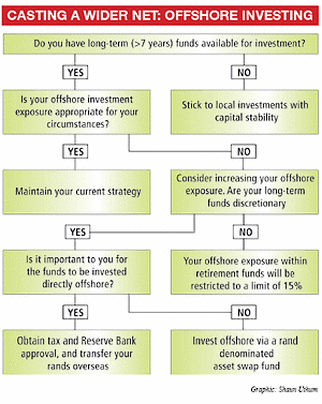5 Little-Known Ways Investing Off Shore Can Grow Your Wealth
Wiki Article
Checking out How Investing Off Shore Functions: A Comprehensive Overview
Spending offshore offers an intricate landscape of difficulties and opportunities. Comprehending the various kinds of offshore accounts is important for anybody considering this path. The advantages, consisting of improved privacy and possession protection, are considerable. Legal and tax obligation implications warrant mindful interest. As capitalists look for to enhance their portfolios, the actions to develop a feasible offshore financial investment method end up being vital. What are the crucial elements that one must browse to succeed in this endeavor?Recognizing Offshore Accounts and Their Types
What drives individuals and businesses to consider overseas accounts? The appeal of economic privacy, asset security, and potential tax obligation advantages frequently brings in the attention of those looking for to handle their wealth more purposefully. Offshore accounts, commonly established in international jurisdictions, come in different forms. Individual accounts deal with specific needs, offering services like cost savings, financial investment, or retired life preparation. Business accounts, on the various other hand, offer firms wanting to assist in global transactions, improve privacy, or enhance tax obligation responsibilities. Depend on accounts offer an added layer of protection, allowing individuals to safeguard their properties for future beneficiaries. Each kind of offshore account provides one-of-a-kind features, usually influenced by the governing setting of the host country. Comprehending these distinctions is crucial for individuals and companies, as the selection of account type can notably impact their monetary approaches and conformity with global laws.Benefits of Offshore Spending
While several capitalists look for possibilities to diversify their portfolios, offshore investing presents distinct benefits that can boost financial growth and protection. One notable advantage is the possibility for property security. Offshore accounts can secure financial investments from political instability or economic recessions in the financier's home nation. Additionally, offshore financial investments commonly provide access to international markets, permitting investors to take advantage of arising economies and markets that might not be available domestically.Another significant benefit is tax obligation performance. Many overseas jurisdictions offer desirable tax obligation routines, which can lessen tax responsibilities and enhance overall returns. Offshore investing can improve personal privacy, as certain jurisdictions apply strict privacy laws.Lastly, overseas accounts can promote riches monitoring strategies by supplying a wider array of financial investment options, including alternative assets such as real estate and products. Jointly, these advantages make offshore spending an attractive choice for those aiming to strengthen their financial portfolios.
Regulative and legal Factors to consider
Guiding via the regulatory and lawful landscape of offshore investing requires mindful interest and understanding. Investing Off Shore. Investors need to navigate a complex internet of laws that differ markedly from one territory to another. Conformity with local laws is vital; failing to do so can result in extreme charges, consisting of fines and imprisonment. Furthermore, knowing the lawful frameworks controling international investments is vital for ensuring the protection of possessions and keeping operational legitimacy.Key factors to consider consist of recognizing the regulative needs for establishing overseas entities, such as counts on or companies, and sticking to anti-money laundering (AML) and know-your-customer (KYC) guidelines. Financiers need to additionally understand reporting responsibilities in their home nation, as lots of nations call for disclosure of overseas holdings. Engaging with lawful specialists experienced in overseas investment can offer important support, helping investors to reduce dangers and safe conformity with appropriate legislations and laws while why not look here optimizing their investment capacity

Tax Implications of Offshore Investments
Recognizing the regulative and lawful considerations of offshore investing normally leads to an exam of the tax ramifications connected with these investments. Offshore investments can supply considerable tax obligation advantages, including lowered tax prices and the possibility for tax deferral. Investors must navigate complex tax guidelines in their home countries, as several territories need taxpayers to report international earnings and assets.For United state residents, the Foreign Account Tax Compliance Act (FATCA) mandates the coverage of overseas accounts, while various other nations have comparable demands. Failure to comply can cause severe penalties. Additionally, particular offshore funds might be subject to unique tax obligation treatments, such as Passive Foreign Financial Investment Business (PFIC) policies, making complex investment strategies.Investors ought to think about consulting tax obligation specialists to comprehend implications specific to their scenarios and warranty compliance with both residential and worldwide tax laws, ultimately making the most of the benefits of their offshore financial investments while reducing threats.Actions to Get Going With Offshore Spending
Several financiers seeking to expand their profiles turn to overseas investing as a sensible choice. To start, one have to perform extensive research study on potential overseas territories, thinking about aspects such as regulatory setting, taxation, and investment possibilities. Investing Off Shore. After selecting an ideal location, financiers should develop an offshore account, which typically needs documents showing identification and source of funds.Next, investors typically involve with an offshore financial investment or a monetary consultant company acquainted with local laws and market characteristics. This collaboration can assist in crafting a customized investment method that straightens with individual goals and run the risk of tolerance.Once the approach remains in area, investors can proceed to choose particular properties or funds for financial investment, guaranteeing they review performance and runs the risk of routinely. Maintaining compliance with both local and home country regulations is vital for successful offshore investing, requiring ongoing persistance and possibly routine appointments with legal experts.Often Asked Concerns
Exactly how Do I Pick the Right Offshore Territory?
Picking the right overseas territory entails evaluating elements such as regulative atmosphere, tax obligation advantages, political stability, and simplicity of doing organization. Researching each option thoroughly guarantees informed decisions that line up with specific financial investment objectives and take the chance of resistance.What Sorts Of Properties Can I Hold Offshore?

Exist Risks Related To Offshore Investing?
The threats linked with overseas investing include legal complexities, regulative adjustments, currency fluctuations, and possible political instability. Capitalists must meticulously evaluate these factors to mitigate risks and warranty conformity with international laws and regulations.How Can I Access My Offshore Finances?
To access overseas funds, people generally need more tips here to call their banks, provide required identification and documentation, and adhere to well-known methods for fund transfers, guaranteeing compliance with both global and regional policies governing offshore financial investments.
What Prevail False Impressions Regarding Offshore Accounts?
Common mistaken beliefs regarding overseas accounts include ideas that they are entirely for tax evasion, absence of law, or obtainable to the affluent. In truth, they can be legitimate financial tools for varied individuals. In addition, offshore investments typically provide accessibility to international markets, enabling financiers to touch into arising economic climates and sectors explanation that might not be offered domestically.Another considerable benefit is tax obligation efficiency. Overseas investing can enhance privacy, as particular jurisdictions implement strict privacy laws.Lastly, overseas accounts can help with riches monitoring strategies by giving a bigger range of financial investment alternatives, consisting of different possessions such as actual estate and assets. Understanding the legal and regulative factors to consider of offshore investing naturally leads to an exam of the tax ramifications linked with these financial investments. Offshore financial investments can offer substantial tax obligation benefits, consisting of lowered tax prices and the potential for tax deferment. After picking a suitable location, financiers need to develop an overseas account, which generally requires documentation showing identity and source of funds.Next, investors usually engage with an economic expert or an overseas financial investment company acquainted with neighborhood regulations and market dynamics.Report this wiki page